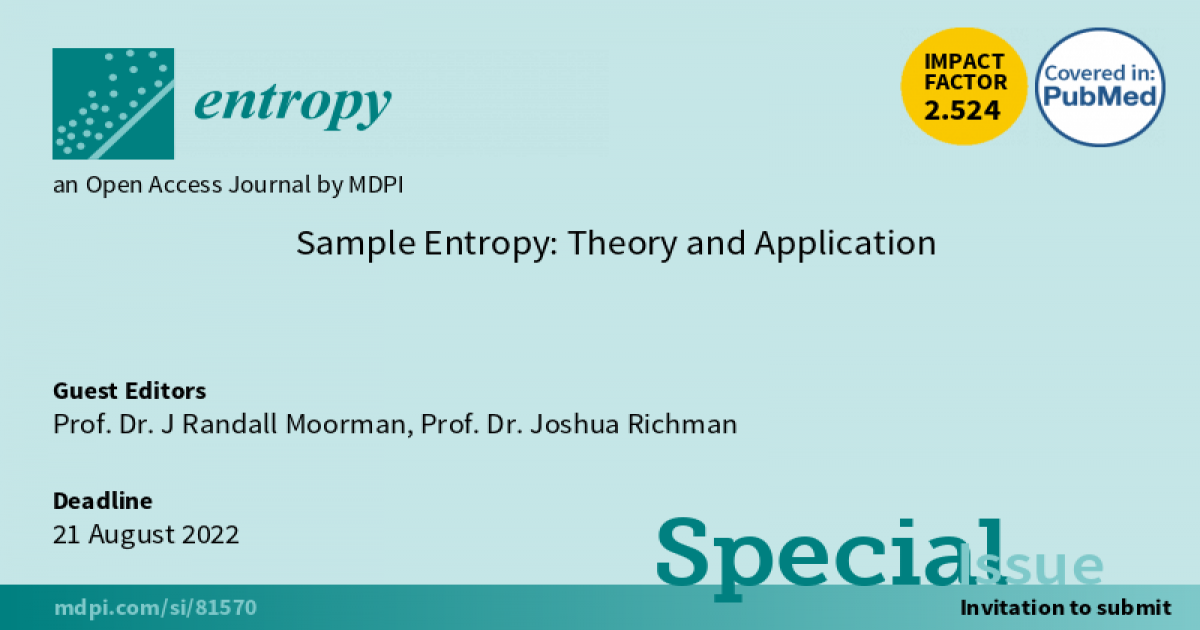Sample Entropy: Theory and Application
A special issue of Entropy (ISSN 1099-4300). This special issue belongs to the section "Entropy and Biology".
Deadline for manuscript submissions: closed (21 August 2022) | Viewed by 11089

Special Issue Editors
Interests: predictive analytics monitoring; early warning scores
Special Issues, Collections and Topics in MDPI journals
Interests: surgical outcomes; epidemiology; biostatistics
Special Issues, Collections and Topics in MDPI journals
Special Issue Information
Dear Colleagues,
Sample entropy has found widespread use as a robust metric for comparing the non-linear dynamical properties of time series. It is based solidly on fundamental ideas and constructs from thermodynamics, information theory, and non-linear dynamical systems, and the works of Boltzmann, Gibbs, Shannon, Kolmogorov, Sinai, Renyi, Grassberger, Procaccia, Eckmann, Ruelle, Pincus, Richman, Moorman, Lake, Costa, Chen, Goldberger and others.
Sample entropy has been successfully applied in many fields, particularly in clinical medicine. The family of members of the sample entropy family is growing, and includes multiscale entropy, quadratic entropy rate, coefficient of sample entropy, and others, all of them with advances in theoretical and application-specific features. New applications of information theory, including techniques of deep learning and recurrent neural networks utilize entropy-based measures, as well. As a result, we see a need to bring together new developments in the theory and application of sample entropy.
This Special Issue will accept unpublished original papers and comprehensive reviews that present new theories, bring insights to current and new applications and methods, or present new directions in the theory and application of sample entropy and its offspring.
Prof. Dr. Joshua Richman
Prof. Dr. J Randall Moorman
Guest Editors
Manuscript Submission Information
Manuscripts should be submitted online at www.mdpi.com by registering and logging in to this website. Once you are registered, click here to go to the submission form. Manuscripts can be submitted until the deadline. All submissions that pass pre-check are peer-reviewed. Accepted papers will be published continuously in the journal (as soon as accepted) and will be listed together on the special issue website. Research articles, review articles as well as short communications are invited. For planned papers, a title and short abstract (about 250 words) can be sent to the Editorial Office for assessment.
Submitted manuscripts should not have been published previously, nor be under consideration for publication elsewhere (except conference proceedings papers). All manuscripts are thoroughly refereed through a single-blind peer-review process. A guide for authors and other relevant information for submission of manuscripts is available on the Instructions for Authors page. Entropy is an international peer-reviewed open access monthly journal published by MDPI.
Please visit the Instructions for Authors page before submitting a manuscript. The Article Processing Charge (APC) for publication in this open access journal is 2600 CHF (Swiss Francs). Submitted papers should be well formatted and use good English. Authors may use MDPI's English editing service prior to publication or during author revisions.
Keywords
- Shannon entropy
- Kolmogorov–Sinai entropy
- Information theory
- Time series complexity
- Cross-entropy
Benefits of Publishing in a Special Issue
- Ease of navigation: Grouping papers by topic helps scholars navigate broad scope journals more efficiently.
- Greater discoverability: Special Issues support the reach and impact of scientific research. Articles in Special Issues are more discoverable and cited more frequently.
- Expansion of research network: Special Issues facilitate connections among authors, fostering scientific collaborations.
- External promotion: Articles in Special Issues are often promoted through the journal's social media, increasing their visibility.
- Reprint: MDPI Books provides the opportunity to republish successful Special Issues in book format, both online and in print.
Further information on MDPI's Special Issue policies can be found here.







